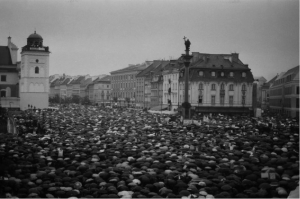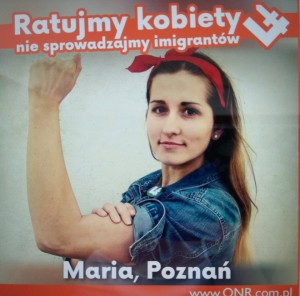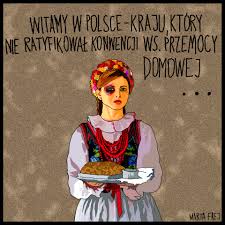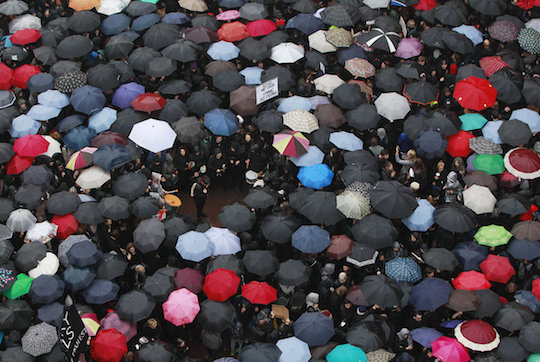A year ago in 2016, thousands of Polish women went on strike from work, dressed in all black and marched on the streets waving black flags and umbrellas to protest a proposal that would make abortion completely inaccessible to them. While they succeeded, Poland still has one of the most restrictive abortion laws in Europe. On the anniversary of the Black Protests this Tuesday, on Oct 3, 2017, Polish women marched again to demand greater reproductive freedom. Feminist writer and columnist Grażyna Plebanek recaps for Asymptote the year of struggle for Polish women’s rights and the role of literature in the protests. —Julia Sherwood
A year ago we women went out into the streets together—young and old, teenagers, mothers, grandmothers. Women from all walks of life. Women from small towns and big cities, educated and uneducated. When I first canvassed women in a Polish shop in Brussels to take part in the Black March last October, I was worried that the shop assistants and shoppers might respond in the time-honoured way: “I’m not interested in politics” or “I’ll leave it to the politicians.” Or the excuse that’s really hard to argue with: “I’ve got enough on my plate already.”
As it turned out, this is an issue that concerns us all: the issue of our freedom and dignity. In October 2016, every one of us in that shop—customers and shop assistants—poured out our grief over what “they” were planning to do to us, by introducing a near-total ban on abortion, making what is already one of the most restrictive anti-abortion laws in Europe even stricter. The following day we marched shoulder to shoulder, united by a real threat—that of being robbed of the basic right over our own bodies. We were being dragged back to the status of women during the Napoleonic times. We would no longer be equal to men and have our lives directed by others, as if we were children.
We went out into the streets in Poland, in Brussels, Berlin, London, Stockholm, New York, and many other cities across the world. In Poland one hundred thousand women joined the protest. A hundred thousand furious women wearing black, armed with symbolic umbrellas. One hundred thousand women, undeterred by pouring rain.

Sea of umbrellas. Warsaw, 3 October 2016. Photo © Tytus Duchnowski
The protests worked but in late August, almost a year later, Polish women once again went out into the streets of Łódź. Again, we wore black. However, this was a smaller and quieter march, an expression of grief. We were grieving for a young woman held captive for ten days by two men who had tortured and raped her. She ran away but later died in hospital. Her injuries were so severe that the doctors couldn’t save her.
What has happened in Poland between the two black marches—between the protests of 2016 and the funeral procession of 2017?
This year has seen a sustained attack on the rights of women. The government is taking away our control over our own bodies. With already severely restrictive abortion laws, now the morning-after pill has been banned by the state, citing bogus side effects. The implication is that a woman should be forced to give birth to a child conceived by rape.
The ruling Law and Justice Party has swept schools clean of the last vestiges of sex education. Teachers in religious education lessons rail against masturbation. Premarital sex is taboo.
Yet, pornography is within easy reach: on television, online, on the phone. It presents sexuality from the male perspective, in a way that, curiously, resonates with the position promoted by the church: that of women dominated by men. In Poland, children are taught religion at school. Catholic religion is part of the matura, the high school leaving exam. Women are objectified, they have men’s wills imposed upon them, and their basic right to their own needs is being taken away.
The number of sex crimes in Poland has also been going up. It is certain to increase further because, subliminally, the current government is sending the message that while rape may be a crime, it can be “allowed to pass.” One of the three men who held the woman in Łódź captive has been released. The woman has died while her tormentor remains at large. And this is happening in the heart of Europe. As in a Hitchcock movie, the tension rises further. Not only is rape being regarded as a “semi-crime,” the principal argument being that since the woman had followed the man to a flat, she was “asking” to be raped.
What is worse is that politicians are using rape to build their political careers. Members of the parliament have milked the subject, demanding that rapists be punished—not, however, Polish rapists, but immigrants. The politicians imply that rape is a part of darker-skinned immigrants’ nature. These statements came in the wake of an incident in Rimini, where several immigrant men attacked a Polish couple and gang-raped the woman.
Still, none of this prepared me for the degree of cynicism displayed on the posters unveiled by the far-right nationalist movement known as the National Radical Camp (ONR). They boast photos of buxom Polish lasses in the style of the famous Rosie the Riveter poster. Above them a slogan in red reads: “Let’s keep our women safe: don’t let immigrants in!”

Fortunately, Polish women are capable of saving themselves. Not from immigrants though, but from the cultural regression that has been devouring what our ancestors fought for. We were empowered by going out into the streets in October 2016. The sea of black umbrellas is an image that has stayed in each and every one of us and found its expression in Marta Frej’s brilliant posters, as well as in my joint regular column with writer Sylwia Chutnik for the prestigious weekly, Polityka. After the protests the magazine gave us this space as the only Polish woman writer duo among the rare breed of female columnists published by the opinion-forming press (rather than women’s magazines).

“Welcome to Poland – the country that hasn’t ratified the
Convention against Domestic Violence” © Marta Frej
This summer Poland has also seen the birth of a new movement, Independent Culture. This aims to bring uncensored culture to the citizenry, providing them with a choice so that they don’t have to rely solely on the state propaganda that dominates public media. The biggest names across the Polish arts scene, including the most popular artists, have joined the movement, which is planning a wide range of activities.
Cultural struggle as a way of maintaining national identity is nothing alien to us. Thanks to this form of resistance we survived 123 years of partitions (in the late eighteenth century, Poland was divided between its neighbours Russia, Prussia and Austria-Hungary, gaining independence only in 1918) and, later, communism. After the transition to democracy in 1989 we thought that literature would no longer have to play this role, yet history has come full circle. This time it is not the sustaining of the basic form of national identity—understood as “a Pole equals a Catholic”—that is at stake. The version this time is being ruthlessly played by a state manufacturing its own heroes for propaganda purposes, glorifying the late President Lech Kaczyński (killed in a plane crash in 2010) and cultivating a martyrology and a vision of long-suffering Poland as the “Christ of nations.”
This image of Poland is false. As the writer Amin Maalouf says in his book, In the Name of Identity: Violence and the Need to Belong, this is a simplified picture, manipulated to fit the requirements of the current powers-that-be. This narrative is built on fear—the fear of strangers, of terrorist attacks, of war. Above all, the fear of one’s own weaknesses, because the Law and Justice party appeals to those who are weak and lost, offering them the strength of a herd united under simple slogans. The ruling party has appropriated the Polish flag, the national anthem and the holidays as covers to promote hatred.
The Polish artists who have set up Independent Culture advocate a variety of identities. Because that is what Poland is like: a diverse country that mustn’t be reduced to a single denominator. Although the populists have already caused great damage, Independent Culture is there for the long haul.
To come back to Maria from Poznań, the young woman who has lent her face to this anti-immigrant campaign poster, I wonder if she was aware that it was “our own Polish, white lads” who had imprisoned her sister in Łódź. The Polish rapists didn’t act in the heat of passion, there was nothing impulsive about their actions. They lured a young woman to a flat and held her captive for over a week, raping and torturing her. It happened in an ordinary block of flats. Outside its the walls life went on as normal, children returned from summer holidays, people took dogs out for walks, the smell of tomato or chicken soup wafted down the stairwell.
Maria from Poznań and other young women who have lent their faces to ONR’s campaign are using the death of a woman from Łódź to climb the career ladder in a nationalist organisation. They are literally walking over corpses.
I am baffled: does Maria from Poznań really believe that ONR membership will keep her safe? That she will escape the fate that met her sister from Łódź? That it is immigrants who might send her to death rather than our own Polish lads?
And another question that nags me: did Maria from Poznań march shoulder to shoulder with us in the black protests of October 2016?
Translated from the Polish by Julia Sherwood.
Grażyna Plebanek is a Polish writer and journalist. A graduate of Warsaw University, she has worked as a reporter for Reuters News Agency and the biggest Polish daily, Gazeta Wyborcza. She lived in Stockholm for five years and since 2005 has been based in Brussels. She is a columnist for the weekly Polityka, Wysokie Obcasy Extra (High Heels Extra) and Trends magazine, and blogs at www.naTemat.pl. Plebanek is the author of several novels, including Illegal Liaisons, which was published in English in 2012, and a collection of literary essays, Córki Rozbójniczki (The Robbermaid’s Daughters). She has won the Złote Sowy (Golden Owls) award for promoting Poland abroad. Her latest novel, Pani Furia (Miss Fury) came out in August 2016.
Julia Sherwood is Asymptote’s Slovakia Editor-at-Large. She was born and grew up in Bratislava, Slovakia, and worked for Amnesty International in London for over twenty years. She is now based in London and works as a freelance translator from and into English, Slovak, Czech, Polish and Russian. Her book-length translations include works by Balla, Hamid Ismailov, Daniela Kapitáňová, Hubert Klimko-Dobrzaniecki, Uršuľa Kovalyk, Peter Krištúfek and Petra Procházková.
*****
Read More Essays:

